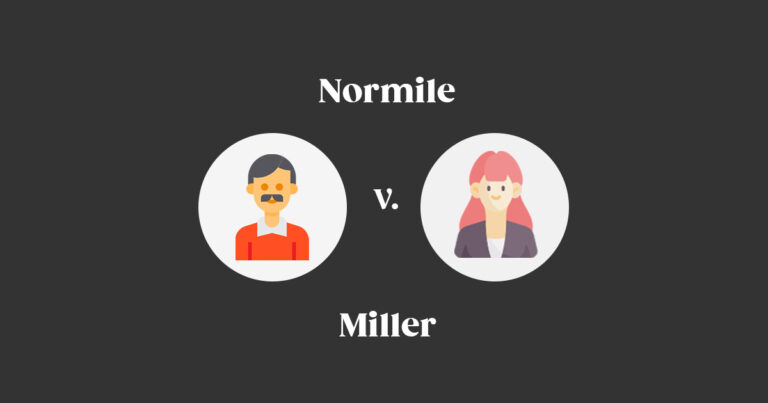Quick Summary
In this case the Supreme Court of North Carolina ruled that there was no enforceable contract between the parties to purchase the property. The court reasoned that the counteroffer presented by Miller rejected Normile’s original offer, as it changed the terms of the offer and no consideration was given to an option contract.
Furthermore, the counteroffer did not promise that the offer would remain open for a specific time. Finally, upon receiving notice of revocation from the real estate broker, Normile’s power to accept the counteroffer had been terminated, making it invalid and unable to be revived.
Rule of Law
A legally binding contract requires an offer, a counteroffer (if any), mutual agreement on the same terms, and consideration.
Facts of the Case
Hazel Miller (the defendant) had listed her real estate for sale with a local realtor. On the same day, Richard Byer, a real estate broker, showed the property to Michael Normile (plaintiff). The plaintiffs prepared an offer to purchase the property, which Miller countered with various amended terms.
Normile did not immediately accept or reject the counteroffer because it contained a $500 earnest money deposit requirement. However, Miller sold the property to another purchaser before Normile accepted the counteroffer. Later that same day, Miller revoked her counteroffer to Normile after they failed to submit their $500 earnest money deposit. Despite this, Normile initialed the offer form and delivered it along with the deposit later that day.
As a result, Normile filed a lawsuit against Miller seeking specific performance of the contract. The trial court denied his motion for summary judgment, and the appellate court affirmed this decision.
Normile then appealed to the Supreme Court of North Carolina.
Issue
Does a legally binding and enforceable option contract exist for the sale of the property between Normile and the defendant, considering the following factors:
- The defendant rejected the original offer but presented a counteroffer that the Plaintiff did not accept.
- The plaintiff later attempted to accept the counteroffer after receiving notice that it had been revoked.
- The counteroffer included a deadline for acceptance.
- The parties did not reach a subsequent agreement.
Holding and Conclusion
No.
There is no enforceable contract between Normile and Miller to purchase the property. The counteroffer presented by Miller was a rejection of Normile’s original offer, as it changed the terms of the offer. Furthermore, no consideration was given to an option contract, and the counteroffer did not promise that the offer would remain open for a specific time.
Upon receiving notice of revocation from the real estate broker, Normile’s power to accept the counteroffer had been terminated.
Reasoning and Analysis
Due to the lack of agreement on the same terms from both parties, the counteroffer made by the seller did not indicate acceptance of the original offer but, rather, was a separate offer. Furthermore, no language in the counteroffer suggested the seller would hold it open until a specific date, and the original offer’s time-for-acceptance provision was not part of the counteroffer. This means the seller did not commit to keeping the offer open, allowing them to accept another party’s offer. Following contract law principles, both parties must assent to the same terms for a valid contract. As such, when Normile failed to accept the counteroffer, it became invalid and could not be revived after it was revoked.
Relevant FAQs of this case
What is an option contract, and how does it differ from a standard purchase agreement?
An option contract is a type of agreement in which the buyer has the right, but not the obligation, to purchase a property at a set price within a specified period. Unlike a standard purchase agreement, the buyer pays a fee for this right, which is generally non-refundable.
- For example: If John wants to purchase a house, he might pay $5000 for a 90-day option contract that gives him the right to buy the house for $300,000 within that period. If he chooses not to exercise that right, he forfeits the $5000 fee, but he is not obligated to buy the house.
Can a counteroffer be considered an acceptance in certain circumstances?
Yes, a counteroffer can be considered an acceptance if it meets certain conditions.
- For example: If a buyer makes an offer to purchase a car for $10,000, and the seller responds with a counteroffer of $11,000 but agrees to throw in a free set of tires, the counteroffer can be considered an acceptance if the buyer agrees to the new terms. However, if the counteroffer changes the terms of the original offer significantly, such as by changing the price or the delivery date, it is generally considered a rejection of the original offer.
Can a contract be revived after it has been revoked by one of the parties?
Generally, no. Once a contract has been revoked by one of the parties, it cannot be revived. In this case, the Supreme Court of North Carolina ruled that Normile’s power to accept the counteroffer had been terminated when the seller revoked it, making it invalid and unable to be revived. However, if the parties wish to enter into a new agreement, they can do so by creating a new contract with new or similar terms and conditions.
Was this case brief helpful?
